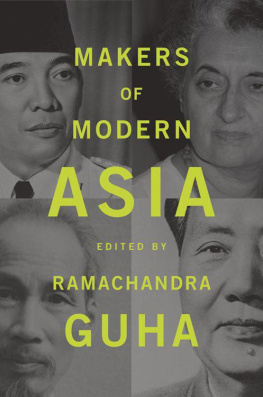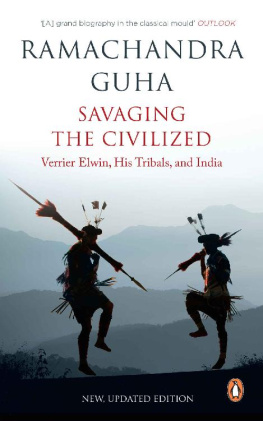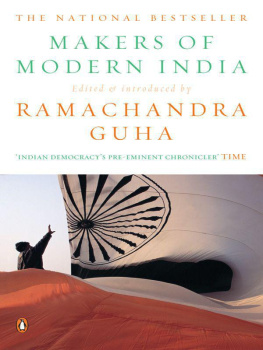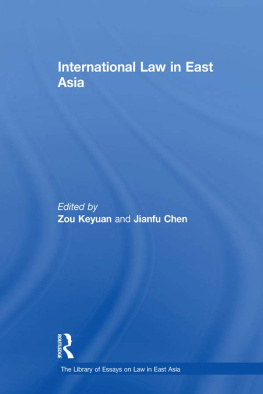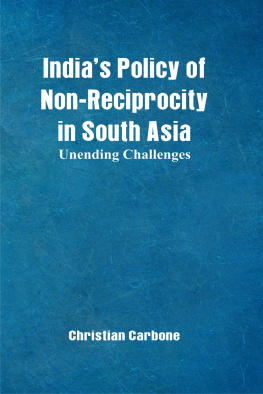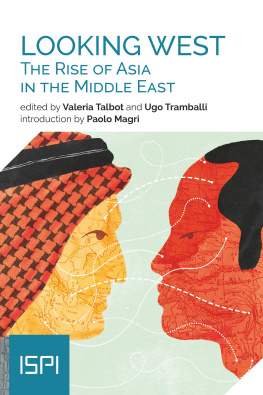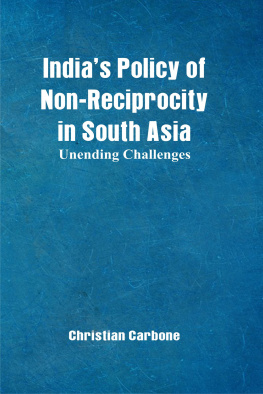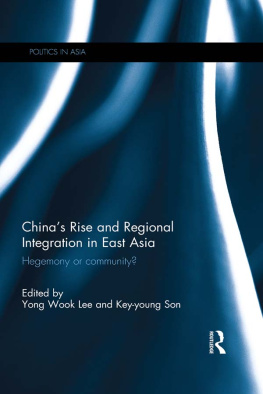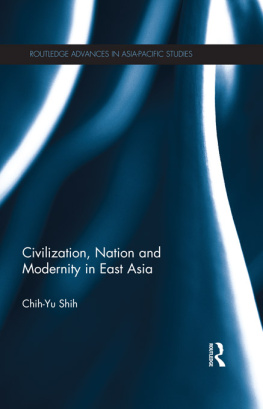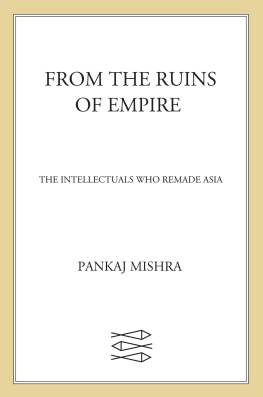MAKERS OF MODERN ASIA
MAKERS
OF
MODERN
ASIA
EDITED BY
RAMACHANDRA GUHA
The Belknap Press of Harvard University Press
Cambridge, Massachusetts
London, England
2014
Introduction and compilation Copyright 2014 Ramachandra Guha
Additional copyright notices appear on , which constitutes an extension of the copyright page
First Printing
All rights reserved
Cover art: Bridgeman Art Library
Cover design: Graciela Galup
The Library of Congress has cataloged the printed edition as follows:
Makers of modern Asia / edited by Ramachandra Guha.
pages cm
Includes bibliographical references and index.
ISBN 978-0-674-36541-4 (alk. paper)
1. AsiaPolitics and government1945 2. PoliticiansAsiaBiography. 3. AsiaForeign relations1945 I. Guha, Ramachandra.
DS35.2.M36 2014
950.4'20922dc23
2014006043
CONTENTS
Introduction
The Politics behind the Economics of Asias Rise
RAMACHANDRA GUHA
RAMACHANDRA GUHA
JAY TAYLOR
SOPHIE QUINN-JUDGE
RANA MITTER
RAMACHANDRA GUHA
CHEN JIAN
JAMES R. RUSH
ODD ARNE WESTAD
SRINATH RAGHAVAN
MICHAEL D. BARR
FARZANA SHAIKH
RAMACHANDRA GUHA
I
I N J ULY 1920, the philosopher Bertrand Russell moved to Beijing with his wife, Dora Black. Russell was that rare animalan English internationalist. He had already traveled through the Soviet Union and was curious to know more about countries and civilizations farther to the east. He spent several months in China, lecturing on technical subjectssymbolic logic, idealism, the theory of relativity, etc.while, on the side, studying the countrys history, culture, geography, and politics. He interacted extensively with students, both on philosophical matters (his Chinese admirers had begun producing a monthly journal devoted to his work) and on their hopes for the future of their country.
Following the end of World War I, nationalist and democratic sentiments were on the rise across Asia. Russells own time in China coincided with the so-called May Fourth Movement. A great intellectual and political ferment was abroad. Long suppressed by foreigners and emperors, the Chinese people were seeking to finally take charge of their destiny.
What Russell saw, studied, and heard was contained in The Problem of China, a short book that he published in 1922 on his return to England. This presented a wide-ranging survey of China past, present, and future, written in the philosophers crisp, economical style, and with a characteristic boldness of generalization. The first paragraph set the tone, declaring that all the world will be vitally affected by
Russells book began with a discussion of Chinas ancient and medieval history. It then investigated Chinas encounters with (and humiliation at the hands of) European powers, as well as its equally tortuous and conflict-ridden relations with Japan. The family-oriented traits of Chinese culture were elaborated, and contrasted with the individualist tendencies of the West. The book ended with chapters on education and industrialization in contemporary China.
Russell was critical of state corruption and the lack of a tradition of philanthropy in China. He noted, and worried about, the political disunity and division, which needed to be overcome if China was to emerge as a self-reliant, self-confident nation in an increasingly competitive world. The main instrument of national renewal, he thought, would be Chinese intellectuals. He distinguished between two generations of modern-minded thinkers: older men who had fought their way out of the traditional Confucian prejudices, followed by a vigorous movement of young reformers, who, if they are allowed a little time, will revivify China and produce something immeasurably better than the worn-out grinding mechanism that we call civilization.
In his final chapter, The Outlook for China, this sympathetic Englishman sought to put himself in the shoes of a progressive and public-spirited Chinese and consider what reforms, in what order, I should advocate in that case. He outlined three main aims: (1) The establishment of an orderly Government; (2) industrial development under Chinese control; (3) the spread of education. These aims had of course to be pursued concurrently, but on the whole their urgency seems to come in the above order.
The establishment of a stable government, Russell further noted, required the cultivation of a sense of cultural as well as political independence. The philosopher was clear that the great powers of the dayAmerica, England, Russia, Japanall had interests which are incompatible, in the long run, with Chinas welfare. Therefore the Chinese must seek salvation in their own energy, not in the benevolence of any outside Power.
I think a spirit of patriotism is absolutely necessary to the regeneration of China, insisted Russell. However, this did not mean a retreat to the bigoted anti-foreign spirit of the Boxers, but a move toward a more enlightened, open-minded, patriotism which is willing to learn from other countries while not willing to allow them to dominate.
II
Bertrand Russell was one of the most prolific writers of his time (or any other). Not all of his several dozen books or thousands of essays have stood the test of time. To the scholar or expert The Problem of China may seem superficial and impressionistic. Yet in one key respectthe placing of politics before economicsit speaks directly to the concerns of this book. For what Russell said about China could equally be said of India, Vietnam, or Indonesia in 1922. These were all likewise subject to humiliation by the Westarguably greater humiliation, since unlike China, each of their territories was entirely controlled by a colonial power. These countries had likewise to gainor regaintheir political and cultural independence before they could embark on economic modernization.
The rise of the nations of Asia is now a commonplace of academic and media discussion. A decade ago, the focus was on the so-called East Asian TigersJapan, South Korea, Singapore, Taiwanwhereas now much attention is being paid to the emergence as global players of the worlds two most populous countries, China and India, whose economic and technological surge has caused a great deal of admirationand perhaps an equal amount of alarmin the West. Just as the nineteenth century belonged to Europe, and the twentieth century belonged to America, we are told that the century we now live in will be dominated by Asia, whose rise is said to be irresistible.
Recent debates on the so-called Asian Century have been largelyif not exclusivelyoriented toward the economic realm. They focus on rising national incomes in Asia, on the rising share of world trade of its countries, on the growing numbers of billionaires in the countries of the region. Western commentators and politicians praiseand sometimes fearthe achievements of Korean car manufacturers, Chinese consumer goods producers, and Indian software engineers. They speak of how Singapore and Shanghai might come to match London and New York as global financial centers. The praise (but not the fear) is welcomed by Asian leaders, gratified that nations long condescended to are at last being taken seriously.
Back in the nineteenth century, when their countries were under the colonial yoke, some Asian thinkers sought solace in the depth of the philosophical traditions to which they were heir. The West might dominate materially and militarily, but in moral and spiritual matters the East was said to be superior. This argument appealed to some
That the Asian continent was the cradle of ancient civilizations, that it had produced great thinkers, musicians, and artists was easy to acknowledge. Yet Asia was not supposed to catch up with (still less surpass) Europe or the United States in economic or technological terms. That societies so long identified with poverty, pestilence, and disease, with back-breaking labor in the field using primitive agricultural techniques, and with conservative social traditions and high levels of illiteracy could come to pose a serious economic (and even political) challenge to the powerful, modern, industrial West ran somewhat counter to the logic of history. Hence the sentiments of surprise, wonder, and alarm that have in recent years been so manifest in articles and books on this striking shift of global economic power toward the east.
Next page
